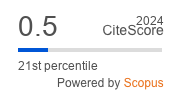ROLE OF IMMUNOHISTOCHEMICAL ANALYSISIN EVALUATION OF PREGRAVID ENDOMETRIUM IN PATIENTS UNDERGOING IN-VITRO FERTILIZATION PROGRAM
Abstract
About the Authors
V. A. KrutovaRussian Federation
Ya. A. Kovalenko
Russian Federation
L. M. Chuprinenko
Russian Federation
A. A. Ordokova
Russian Federation
O. V. Tarabanova
Russian Federation
References
1. Вартанян Э.В., Мартышкина Е.Ю., Цатурова К.А. Роль сочетанной патологии в неудачных протоколах ЭКО. Акушерство, гинекология и репродукция. 2011; 4: 40-44.
2. Овчарук Э.А. Хронический аутоимунный эндометрит как одна из главных причин нарушения репродуктивной функции: обзор литературы. Вестник новых медицинских технологий. 2013; 1.
3. Крутова В.А., Ермошенко Б.Г. Причины женского бесплодия: обзор литературы. Успехи современного естествознания. 2005; 11: 16-19.
4. Крутова В. А. Социально-психологические и медицинские аспекты лечения женского бесплодия. Дисс. На соискание ученой степени канд. мед. наук. Архангельск. 2006; 150 с.
5. Шнейдерман М.Г., Аполихина И.А., Калинина Е.А., Абубакиров А.Н. и др. Новое об имплантации эмбриона в эндометрий. Акушерство и гинекология. 2013; 11: 75-78.
6. Edgell T.A., Rombauts L.J., Salamonsen L.A. Assessing receptivity in the endometrium: the need for a rapid, non-invasive test. Reprod. Biomed. Online. 2013; 27(5): 486-496.
7. Fatemi H.M., Popovic-Todorovic B. Implantation in assisted reproduction: a look at endometrial receptivity. Reprod. Biomed. Online. 2013; 27(5): 530-538.
8. Кравчук Я.Н., Калугина А.С. Оценка рецептивности эндометрия с помощью биомаркеров: обзор. Журнал акушерства и женских болезней. 2012; 6: 61-67.
9. Amyan T.S., Perminova S.G., Krechetova L.V., Vtorushina V.V., Mityrina E.V. Repeated implantation failures in an IVF program: immunological aspects. Obstetrics and gynecology. 2017; 1: 5-12.
10. Крутова А.В., Асланян И.Э., Чулкова А.М., Авагимова О.В. и соавт. Немедикаментозная коррекция гормонального фона и психовегетативного статуса у женщин с патологией репродуктивной системы в здравницах Краснодарского края. Вопросы курортологии, физиотерапии и лечебной физической культуры. 2011; 6: 28-33.
11. Колмык В.А., Насыров Р.А., Кутушева Г.Ф. Клинико-иммуногистохимические аспекты восстановления репродуктивной функции женщин с хроническим эндометритом. Журнал акушерства и женских болезней. 2014; 4: 34-38.
12. Коган Е.А., Демура Т.А., Водяной В.Я., Шуршалина А.В. Молекулярные и морфологические аспекты нарушений рецептивности эндометрия при хроническом эндометрите. Архив патологии. 2012; 3: 15-17.
13. Бессмертная В.С., Самойлов М.В. Рецепторы к эстрогенам и прогестерону в эндометрии женщин при бесплодии. Вестник РУДН. 2007; 2: 48-51.
14. Казачкова Э.А., Хелашвили И.Г., Казачков Е.Л., Воропаева Е.Е. и соавт. Хронический эндометрит: клинико-морфологическая характеристика и особенности рецептивности эндометрия. Уральский медицинский журнал. 2014; 4: 47-52.
15. Rai P. et al. Proteome of human endometrium: identification of differentially expressed proteins in proliferative and secretory phase endometrium. Proteomics Clin. Appl. 2010; 4(1): 48-59.






































